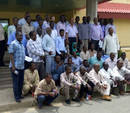News

Work is underway in Sudan to help the country reduce its greenhouse gas emissions and pursue low-carbon development through creation and implementation of National Forest Inventory (NFI) as a necessary step towards REDD+ readiness.
Sudanese NFI teams have been in the field in North Kordofan State since May 2017, collecting data under a Technical Assistance Agreement signed between the Government of Sudan and FAO late last year. Under that agreement, FAO is supporting Sudan’s Forests National Corporation (FNC), part of the country’s Ministry of Agriculture and Forestry, to also design and implement a measuring, reporting and verification (MRV) system for REDD+....

Accurate and consistent information on forest area and forest area change is a requirement if a country is to access results-based payments for its REDD+ activities. The goal is to obtain as accurate area estimates as possible but what is ‘as accurate as possible’?
‘What is the level of precision a country can achieve when estimating its area of forest and how the area is increasing or decreasing over time’?
These questions can help clarifying the complex issue of area estimation but do not have straight-forward answers. The accuracy depends on many factors which experts from FAO, FCPF, GFOI, USFS, JRC of EC,...

Most developing countries participating in the REDD+ process and willing to access Result Based Payments (RBP) are now in transition from their readiness phase to implementation of specific actions and measures. Most of these countries have developed and/or strengthened their National Forest Monitoring Systems (NFMS) which are also moving towards the implementation phase and towards the monitoring of the results of mitigation actions. However, many countries still face multiple challenges in accessing the information and data they need to make their NFMS sustainable in the long term.
Latin America countries advance together in preparation of national Greenhouse Gases Inventories
01/08/2017
01/08/2017

FAO and the Argentina UN-REDD National Programme supported the second Working Meeting of the Latin American Network of National Greenhouse Gases Inventories (NGHGI) in Buenos Aires in early July. Technical specialists from a dozen countries discussed their work in preparing their NGHGI with the ultimate objective of periodically present their Biennial Update Reports (BUR) and National Communications (NC) to UNFCCC. Exchange of experiences and knowledge on quality assurance and control procedures, management of information and reporting of NGHGI were discussed.

Countries are showing significant progress in measurement, reporting and verification of REDD+ activities under the United Nations Framework Convention on Climate Change (UNFCCC), says a new paper launched at an FAO REDD+ event.

